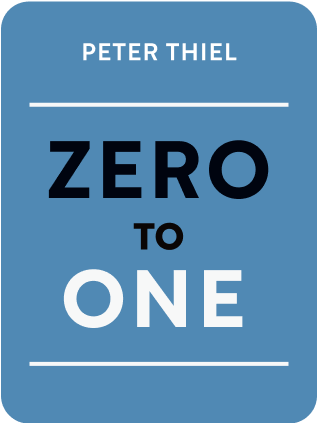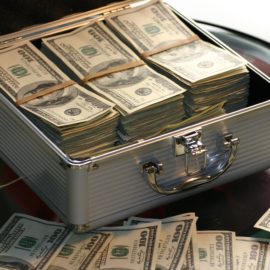

This article is an excerpt from the Shortform summary of "Zero To One" by Peter Thiel. Shortform has the world's best summaries of books you should be reading.
Like this article? Sign up for a free trial here .
Who are the top tech founders of all time? What makes them successful?
In Zero to One, Peter Thiel offers examples of top tech founders, and why they were successful. Read about top tech founders and the future of technology.
Zero to One and the State of Tech
In Zero to One, PayPal co-founder and venture capitalist Peter Thiel contends that creating new things is the best way to profit economically, as well as the only path for human progress.
However, technology has stagnated today. Much of what we do repeats or builds on what’s been done before. It’s easier to copy something than to create something new. This moves the world from 1 to n, refining something that already exists. However, creating something entirely new moves us from 0 to 1.
Unless companies create new things, they’ll eventually fail regardless of how profitable they are today. There’s a limit to what we can gain by refining things, a point at which best practices won’t get us any further. We need to break new ground. Not only does Thiel explain how it’s done, but offers examples of top tech founders who have changed the game.
Top Tech Founders
The six people who started PayPal (Peter Thiel’s company) were eccentric: they had unconventional backgrounds and sometimes strange interests (four of them built bombs in high school). However, for the tech world, PayPal’s founders weren’t that unusual: tech entrepreneurship and eccentricity seem to go together. This can be mostly a strength if it doesn’t get out of hand.
Many top tech founders have traits that are both extreme and paradoxical. For instance, they may be:
- Cash poor but millionaires on paper
- Obnoxious but also charismatic
- Insiders and outsiders
- Both famous and infamous
Sometimes top tech founders purposely exaggerate certain traits, or their admirers exaggerate them to build a myth. Other times, founders are just “naturally” extreme—they’re unusual from the beginning and seem to get more unusual as life goes on.
Examples of eccentric top tech founders include:
Howard Hughes, who died in 1976, was known during his era as one of the richest people in the world. He produced nine successful Hollywood films and designed and built aircraft that set multiple speed records. Later, he became known for eccentric behavior and a reclusive lifestyle, driven by obsessive-compulsive disorder.
Richard Branson, the billionaire founder of the Virgin Group, which includes more than 400 companies, started his first business at 16 and founded Virgin Records at 22. He started Virgin Atlantic Airways in the 1980s and in 2004, founded a spaceflight corporation. He won media attention and built a brand through various eccentricities—for instance, serving airline passengers drinks with ice cubes shaped like his head.
Sean Parker, who founded Napster and later was founding president of Facebook, was a hacker in high school, who came to the FBI’s attention and was arrested. He got into legal trouble again with Napster, which was shut down by the courts. He had to leave Facebook after allegations of drug use, but he garnered admiration after Justin Timberlake’s portrayal of him in the movie The Social Network.
Steve Jobs, Apple’s co-founder, was forced out in 1985, but he returned in 1997 to revive the company. Jobs could be both charismatic and crazy. Early in his career, he walked around barefoot, refused to shower, and ate only apples. But when he returned 12 years after his ouster, he turned Apple into one of the most valuable companies in the world by introducing the iPod, iPhone, and iPad.
Apple’s dependence on Jobs for its success demonstrates how tech companies can become like monarchies and how that can sometimes be a good thing. A dominant founder can make unilateral decisions, build strong loyalty, and shape a company’s future.
Businesses need the vision and leadership of founders. Those who seem extreme may be the people best equipped to push companies beyond incremental improvements. However, founders should be wary of self-mythologizing and losing a grip on reality.
Technology of the Future
A Forbes magazine headline once asked: “Will a machine replace you?” But there’s nothing to worry about because computers complement human abilities—they don’t substitute for humans. In the future, the most valuable businesses will be the ones that use technology to help and empower people to do things better, not replace them.
Humans can replace or substitute for each other as a result of globalization—for instance, Indian, Chinese, or Mexican workers can replace American workers in manufacturing and customer service.
However, the challenge of the future won’t be labor competition between countries, it will be competition for resources. People in all countries will demand more comforts as their countries develop through globalization and their basic needs are met. The answer to competition for scarce resources is technology that helps people live better. It’s up to the future of top tech founders to decide how that happens.
People and computers are good at different things. People excel at making plans and decisions in complicated situations; they’re not as good at analyzing huge amounts of data. In contrast, computers excel at processing data, but can’t make judgments that are easy for humans.
The different capabilities of humans and computers mean that we can gain more from working with computers than from trading with other people. Other people are like us and do what we do; in contrast, technology helps us do more. People substitute; technology enhances.
Remember, if you’re forming a startup your goal isn’t to act like top tech founders. Your product and comprehensive business plan should do the work.

———End of Preview———
Like what you just read? Read the rest of the world's best summary of Peter Thiel's "Zero To One" at Shortform .
Here's what you'll find in our full Zero To One summary :
- Why some companies genuinely move the world forward when most don't
- How to build a company that becomes a monopoly (and why monopolies aren't bad)
- Silicon Valley secrets to selling products and building rockstar teams






